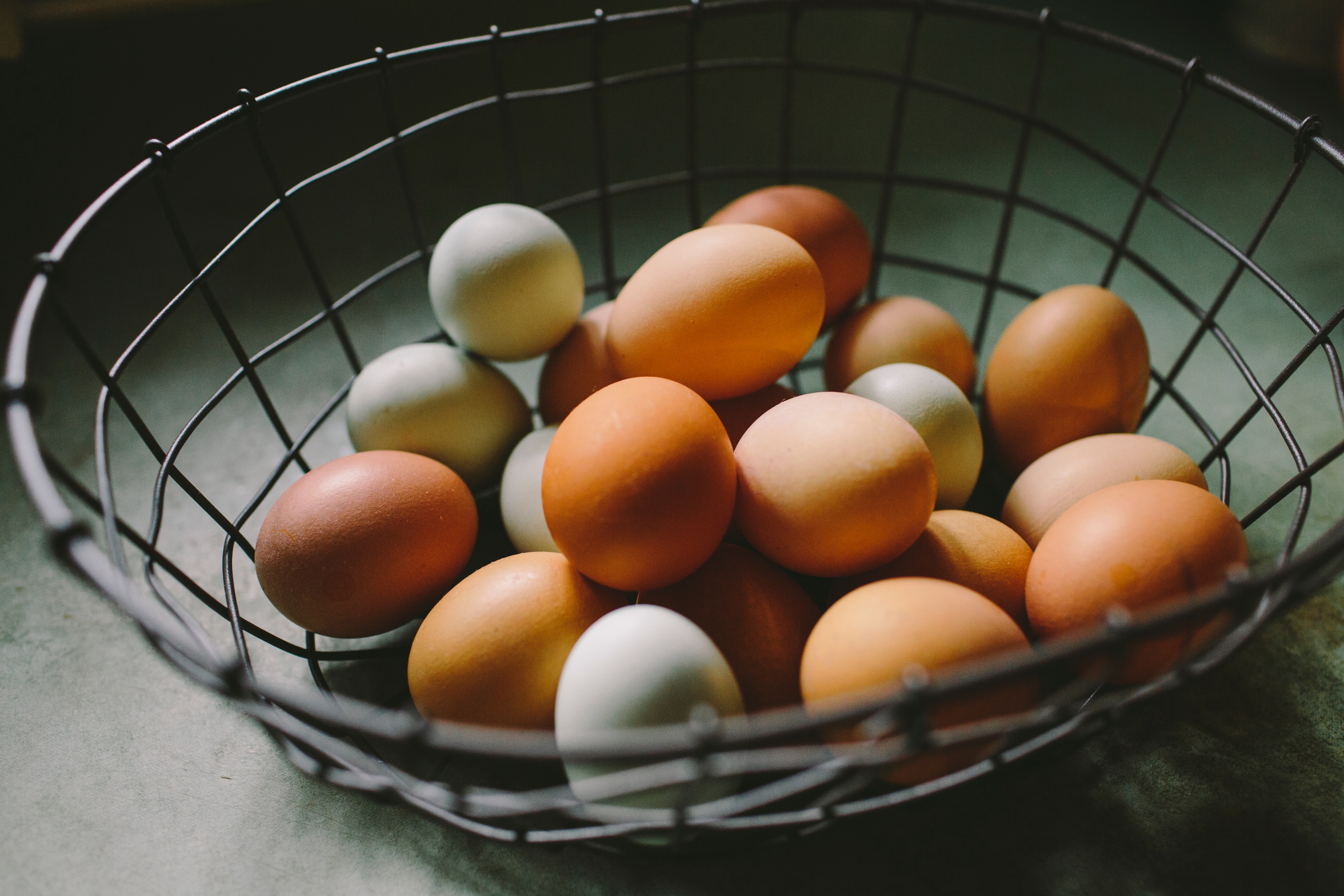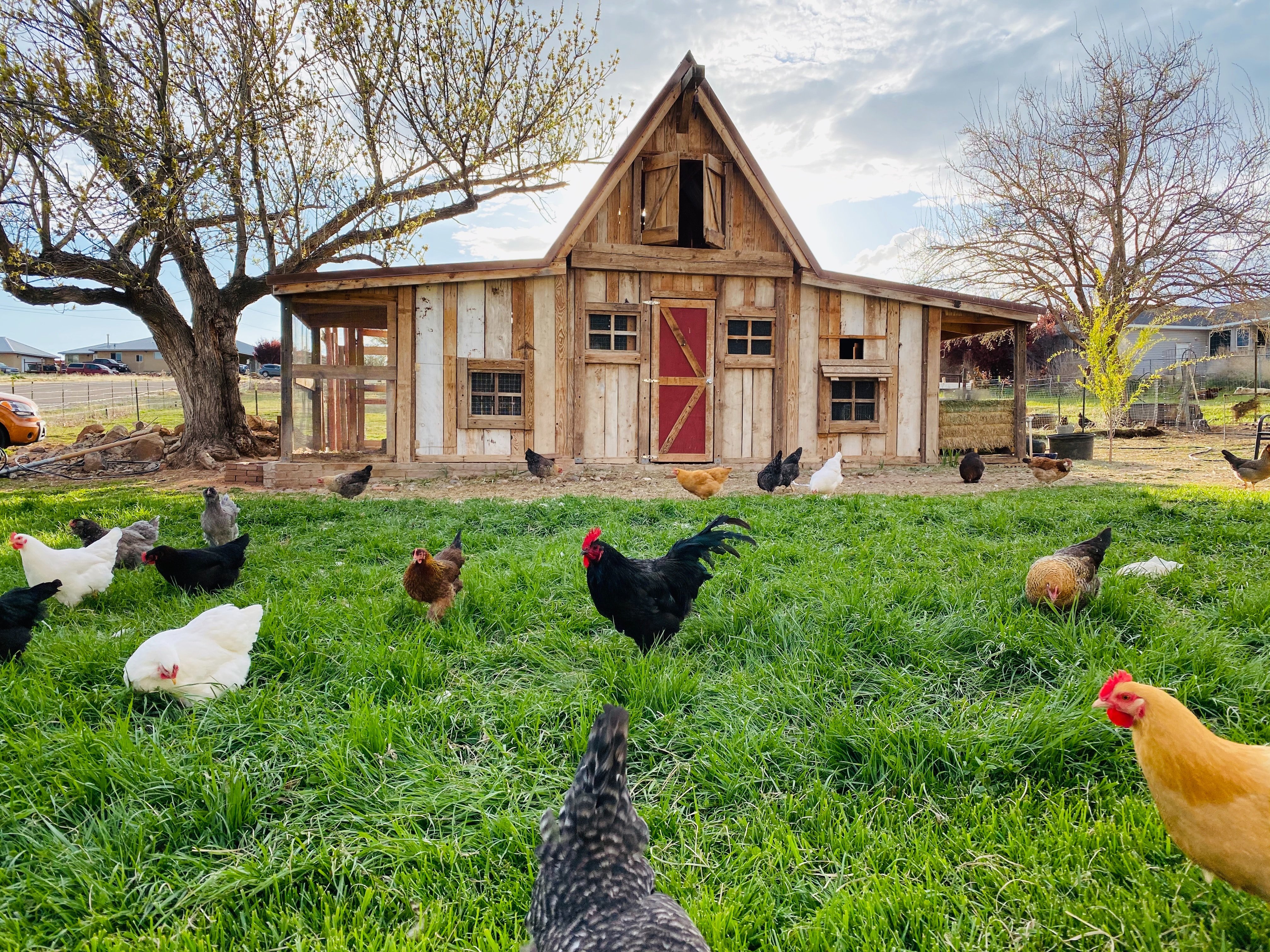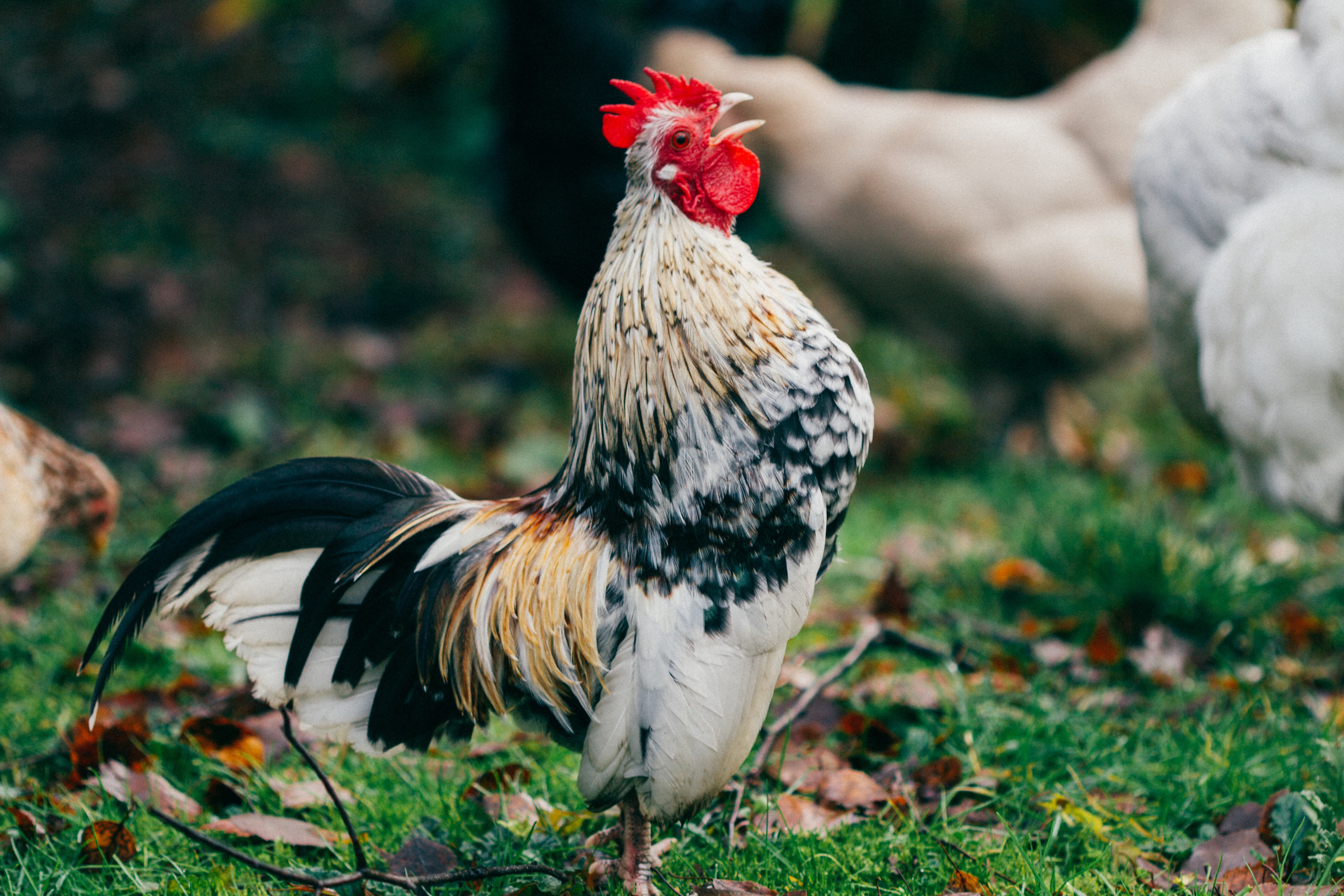Why you should raise chickens
Chickens for the Win!
Have you noticed that everyone seems to be buying chickens lately? Are you thinking that chickens might be a great way to build self-sufficiency? Do you dream of eating farm-fresh eggs produced by your very own chickens?
Here are 5 Considerations before keeping chickens. This article is part of a series to help you make purchasing decisions about different farm animals. You can sign up for a FREE Farm Animal Challenge for further instruction and inspiration!
What is your purpose for keeping chickens?
The main purpose for keeping chickens is obviously for egg production to feed yourself and your family. But you can also keep hens to sell eggs, or even to raise chicks to sell. Another reason to keep chickens is for pets!
Let's explore each of these purposes for chickens.
Fresh, Delicious Eggs
The main reason to keep chickens is to develop self-sufficiency. One of the reasons keeping chickens is so popular these days is because of the farm-fresh eggs they lay. Once you taste an egg laid by your very own chicken, it is hard to go back to any store-bought egg. The yokes are a dark, golden yellow. The whites are thicker, and they just taste better. If you love eggs, you will really love the eggs your very own chickens lay.

Chickens for Profit
Chickens can be profitable, but if you are just starting out, I suggest you start with just a homestead flock to see if you like chickens before expanding to a profitable flock.
There are three main ways to earn money from chickens: selling eggs, selling meat, and selling chicks.
Chickens as Pets
Are chickens really pets? I am sure you have seen the youtube videos of the very tame chickens interacting with their owners or wearing little chicken clothes.
You may have seen the video of a chicken "giving a hug" to a boy.
This video is cute to watch, but it is not typical chicken behavior. This chicken was probably handled continually and had a one in a million temperament. If you watch the video closely, the black rooster shows some pre-attack behaviors, but the video stops before we see what happens next. Typically, chickens do not like to be held, but many will tolerate it.
However, chickens do make excellent pets. But not the kind of pet you snuggle with. They are the kind of pets you watch. I have been able to train my chickens to come when called by using food scraps to imprint their behavior.
What is the cost of keeping chickens?
Chickens do not have to be expensive to keep. However, with the growth in chicken popularity, you can get carried away with all the shiny, new chicken accessories and extravagant coops available these days.
CHICKENS BASICALLY NEED 5 THINGS TO SURVIVE AND THRIVE.
Food
Most likely you will feed your flock, commercial chicken feed. Therefore you will need a feeder. If you live on a farm like us, we give them ground corn, oats, and sometimes soybeans that we grow, along with their favorite treat - kitchen scraps.
Eggshells
I feed my chickens just about anything including eggshells. They love eggshells because it helps to make the shell on their eggs strong. This prevents you from having to buy oyster shells for your chickens.
Eggshells provide much-needed calcium needed for layers. If for some reason you do not have eggshells, you should buy them oyster shells at the local feed store. It is best to keep eggshells or oyster shells in a separate container. Those hens that need it will take it, the others will not.
I used to grind up the eggshells, now I just give them broken shells and they will peck as much as they would like. Some people will cook eggshells to get rid of any harmful bacteria. I do not. I give them raw eggshells and have never had a problem.
Grit
You should also provide grit. Grit itself is made from very small pieces of granite or flint that chickens can gulp down easily. Grit can be easily purchased at the feed store or online and is pretty cheap since it will last a long time. Chickens should always have access to grit. It is what helps them to digest their food. However, if your chickens are free-range and there is a gravel driveway nearby, they will peck the gravel. I usually only provide grit in the winter when all the gravel is under the snow.
The beautiful thing about chickens is that they are pretty self-sufficient. If you free-range them, they love to hunt for bugs and seeds. They will scratch through piles of dirt to find microorganisms.
Water
Chickens need fresh water daily. A chicken waterer will keep the water cleaner, but you could use any dish that will give enough water to them.
Bedding
We use wheat straw, corn fodder, or soybean fodder as bedding. I like to use pine shavings in the nesting box. Pine shavings can also be used as bedding in the coop, however, I prefer straw or fodder. Contact a local farmer if you do not produce your own crops.
Nesting Box
You can purchase nesting boxes like this one. However, you can also use items that you already have. My current nesting boxes are made out of plastic cat litter containers like these. They are sitting on the floor of the coop, but I do plan on hanging them on the wall. Pinterest has a variety of DIY nesting box ideas from items you have around your home.
 Shelter
Shelter
A.k.a a chicken coop. Chicken coops can be as simple as using a building already on your homestead to building one, to buying one. The possibilities are endless. I suggest you set a budget before you begin searching for a coop. One trip to Pinterest in search of coop designs can be overwhelming and expensive.
The characteristics of a good coop are: weatherproof, but not insulated, predator-proof, have nesting boxes as a roost for chickens to sleep on at night. Laying hens are hardy and do not need artificial light or heat in the winter.
What are the ADVANTAGES of keeping chickens?
Laying Hens are easy to care for
Even if you work full-time or are very busy, hens do not require much time to care for. You can simply let them out in the morning, and feed and water them. Then shut them in at dusk, check their food and water and collect the eggs. Then on a weekly basis, clean their coop. Honestly, since my hens are free-range and don't spend much time in the coop, I only clean it quarterly.
Hens Produce Beautiful, Delicious Eggs
As I mentioned earlier, one of the best reasons to keep chickens is for the beautiful, golden yolk eggs they produce. Your chickens will lay many eggs in the spring, summer, and even fall. Depending on your location, they will not lay as many in the winter due to the lack of light.
If your chickens produce more eggs than you can eat you can always share with friends and neighbors, sell them or even preserve them. I read once that eggs are the perfect food for health and nutrition and I believe it!
Laying Hens are Friendly
Laying Hens are not only friendly but as I said earlier, self-sufficient. If you free range your hens, they will hunt for food beyond the feed that you provide for them. Your hens will get to know you and your voice. If you bring them special treats such as kitchen scraps and call them, they will come when you call them.
Laying Hens are Garden Helpers
- Composted chicken manure from your garden.
- You can feed garden weeds and scraps to chickens
- Chickens can eat pests during the off-seasons of gardening.
Laying Hens are a great starter animal
Laying hens are a great starter animal when you just begin your homesteading journey. They require little care and are not expensive to keep. Not only that, but hens are also the gateway animal to other farm animals. You might just get the homestead fever and end up with a farm full of animals like me. Since I have owned hens, I have also purchased ducks, guineas, turkeys, and geese.
Watching Hens is relaxing and fun
Who needs T.V. if you have laying hens? Chickens are so fun to watch. They scratch, peck, and cluck all over your yard. You can forget your troubles while watching chickens.
The DISADVANTAGES of keeping chickens?
Chickens can be destructive
One main disadvantage of keeping hens on the homestead is that they can be destructive. From scratching out your garden or flowerbeds to making dust baths on any small patch of dirt they can find. Of course, they also leave behind manure everywhere.
There are some things you can do to reduce these problems. But chickens are going to be chickens. If you pride yourself on a beautiful yard, chickens are probably not for you. Unless you keep them in a chicken run, rather than free-range them. If you do keep them in a run, they will scratch it down to dirt and there will probably not be a blade of vegetation left. You will also need to clean it out quite often.
Roosters are Loud
If you purchase straight-run chicks, you will no doubt end up with some roosters. Straight-run means that you receive both male and female chicks. Then you will have to figure out a way of getting rid of the roosters.

Roosters are not necessary for hens to lay eggs unless you want to hatch out chicks. If you live in a suburban area, roosters are usually not allowed for good reason. They are very loud and they start crowing very early in the morning, sometimes even in the middle of the night! I have gotten used to the crowing and it doesn't wake me up anymore, but it does take some getting used to.
Roosters can become mean as they get older. It really just depends on the bird, but if you have small children, you must take this into consideration. My daughter was attacked by a rooster when she was just 2 1/2 years old and has a scar on her face now. That rooster quickly became chicken pot pie.
Roosters definitely have their place in a chicken flock. I have learned to replace my rooster every year or two to prevent inbreeding and developing mean roosters. My farm has become a refuge for city roosters, however, usually, they end up in the freezer.
I admit that I am biased about laying hens because I love owning chickens. But I did my best to give you my unbias opinion of owning chickens. Laying hens are an easy and fun farm animal to build self-sufficiency.
Not ready to purchase chickens yet? Check out my article "Where do your eggs come from?" It will help you move towards self-sufficiency by sourcing local eggs.
Finally, be sure to sign up for the FREE 5-Day Farm Animal Challenge for further instruction and inspiration!
